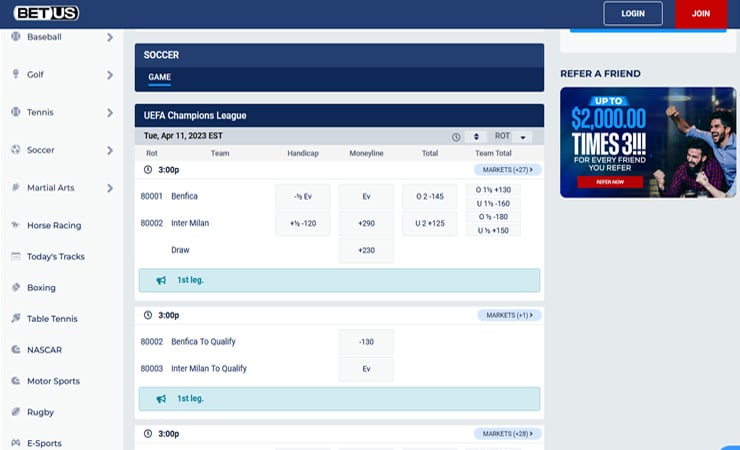Alan Kendall joined Basketball Insiders in January, 2023 with over fifteen years of experience writing about online sports betting. He is an experienced writer with a strong interest in the NBA, NFL, NHL and UFC. Alan brings a wealth of knowledge to every piece he contributes to and has written for many publications including Augusta Free Press and The Sports Daily.
All posts by Alan KendallExpected Value (EV) is a useful tool for determining the potential monetary outcome of a bet by taking into account the disparity between the predicted probabilities. It allows you to calculate the variance between your own assessments and the forecasts made by the bookmaker.
When you identify a situation where you believe a team has a higher likelihood of winning than what the sportsbook indicates, it is considered a value bet and is assigned a positive EV. Conversely, if you perceive that the team has a lower chance of winning, a negative EV is assigned.
- Show full guideShow less
Why is EV important for Bettors
Identifying expected value bets consistently will allow you to become a profitable bettor long-term.
Let’s take a look at a couple of examples below.
In an NBA game between the Boston Celtics and Philadelphia 76ers, the Celtics may be priced at moneyline odds of +120, giving them an implied probability of 45.45%. However, if you believe that the Celtics have a greater chance of winning than 45.45%, you have identified positive EV and can bet accordingly.
Similarly, in an NHL game between the Pittsburgh Penguins and New Jersey Devils, the Penguins may be priced at moneyline odds of +300, giving them an implied probability of 25% to win. If you think they’re less likely to win than this because their star player has suffered a last minute injury, you have identified negative EV.
How to Calculate EV
To calculate EV, you need to work out the probability of the outcome occurring. You can do this by adding the sportsbook’s positive moneyline odds to 100 then divide the number by 100. You can use an odds comparison table to view the likeliness of the result as a percentage as suggested by the sportsbook.
The formula is as follows:
EV = (Winning Probability * Potential Profit) – (Losing Probability * Wager Amount)
100 / (Odds + 100)
Therefore, if the odds on offer are +150 (underdog), the calculation is:
100 / (150 + 100) = 40%.
If the odds are negative (favorite), you need to divide by the line number instead of 100, as follows:
Odds / (Odds + 100)
In the event of odds being -200, the calculation is:
200 / (-200 + 100) = 66.67%.
You can also use the probability from your own predictions or from another sportsbook site, and divide it by the sportsbook to get the value bet margin.
If we take the above probability example of 40% from the sportsbook, and use our own prediction of 45% (where we think a team has a 5% greater chance of winning), we can do the following calculation:
45%/40% = 1.13.
You can use the above calculation to utilize value betting and consistently return profit, regardless of the sport you are wagering on. The key to calculating EV is to give yourself plenty of time to find value bets, with earlier markets proving more beneficial. We’ll cover more on this and other tips further into this guide. In the meantime, keep reading as we discuss the key differences between positive EV and negative EV.
Distinguishing Positive and Negative Expected Value (EV)
Positive expected value (EV) occurs when you perceive that the odds set by a sportsbook or odds-maker are undervalued, while negative EV arises when they are overvalued. The key distinction between positive and negative EV lies in the potential for long-term profit or loss.
![What does EV mean in betting? Complete EV Betting Guide [cur_year]](https://www.basketballinsiders.com/wp-content/uploads/2023/07/Ev-betting.jpg)
Source: BetUS.com To illustrate, let’s consider a real-world scenario:
In an NFL playoff game between the Kansas City Chiefs and the Philadelphia Eagles, you might believe that the Eagles have a higher likelihood of defeating the Chiefs due to an injury to the Chiefs’ star player, Patrick Mahomes. Identifying this as a positive EV opportunity, you seize the value bet by placing your wager before the line adjusts or the odds are updated.
It’s important to note that negative EV does not always guarantee a financial loss or render a betting opportunity unprofitable. Betting odds are subjective, allowing room for accurate predictions regarding the outcome of an event or game that differ from those of the sportsbook or betting-exchange user.
Exploring the Impact of VIG on EV Calculations
VIG, also known as vigorish, plays a fundamental role in determining the expected value (EV) of a bet. It represents the fee levied by bookmakers on every market and significantly affects the calculation of EV.
As mentioned earlier, the implied probabilities in the previous example do not add up to 100% due to the inclusion of VIG. The specific VIG amount varies between 3% and 20%, depending on the type of bet and the chosen betting site.
Let’s take a practical example into account:
Let’s consider we are betting on the NBA game between the LA Lakers and the Denver Nuggets, with implied probabilities of 33.3% for the Lakers and 71.4% for the Nuggets on the moneyline. These probabilities combine to a total of 104.7%, indicating that the betting site will retain a profit of 4.7% solely from this bet.
Consequently, finding the expected value becomes challenging since the actual odds do not reflect the true odds. Essentially, you need to identify discrepancies in the odds exceeding the 4.7% margin, either positively or negatively, to account for the VIG. Falling short of this threshold would result in a bet that lacks positive expected value (+EV).
Tips to Identify Value in Betting
As we look to wrap up our guide to EV betting, you should no longer be asking yourself the question what does EV mean in betting, but instead looking to make a decision on whether it is right for you and how to use it successfully. Ultimately, if you want to make a profit from sports betting consistently, you can examine and study expected value as part of a long-term ROI strategy using the tips below.
Look For Early Lines

Source: BetUS.com As soon as a sportsbook operator releases its betting lines, you can capitalize on potential value bets before the average bettor influx begins. It is common for opening lines to fluctuate before a game kicks off, particularly if they have been released a few days in advance.
Avoid Betting on Your Favorite Team
Avoid betting with your heart and bet with your head by avoiding your favorite team. EV betting allows you to separate business from pleasure and make informed decisions that aren’t skewed by passion or adrenalin.
Be Wary of Public Betting
The general public often bet on popular or favorite teams from within a particular sport, such as the Los Angeles Lakers in the NBA, or New England Patriots in the NFL. However, these teams get the most attention from the media and sports fans, which can distort the lines and potential value in a bet.
Use Market Makers
Using the market makers in a particular sport to view odds and lines will allow you to be ahead of the game before the rest of the market follows. If you can identify who the market makers are, you can see the market move before other sportsbook betting lines are updated.
FAQs
What is EV in betting terms?
EV stands for Expected Value and is a method used to measure the gap in probability between the sportsbook predicted outcome and the bettors, to identify value bets and calculate how much profit can be won.
How do you calculate EV on a bet?
EV is calculated by dividing your expected outcome probability by the implied probability of the sportsbook. Resulting in a +EV or -EV probability gap.
What does plus EV mean?
Plus EV is positive expected value and is used in betting to describe an outcome that has a higher chance of winning than is suggested by the sportsbook.
Is EV betting profitable?
EV betting is profitable if you find value bets consistently and take into account the margin that sportsbook operators build into their odds.
What is positive EV vs negative EV?
Positive EV means you will place a wager that has a better chance of winning than the sportsbook's implied probability implying long-term profit. Whereas negative EV is a wager placed that has a lesser chance of winning and potentially long-term losses.

Alan Kendall joined Basketball Insiders in January, 2023 with over fifteen years of experience writing about online sports betting. He is an experienced writer with a strong interest in the NBA, NFL, NHL and UFC. Alan brings a wealth of knowledge to every piece he contributes to and has written for many publications including Augusta Free Press and The Sports Daily.
All posts by Alan KendallAlan Kendall joined Basketball Insiders in January, 2023 with over fifteen years of experience writing about online sports betting. He is an experienced writer with a strong interest in the NBA, NFL, NHL and UFC. Alan brings a wealth of knowledge to every piece he contributes to and has written for many publications including Augusta Free Press and The Sports Daily.
All posts by Alan Kendall